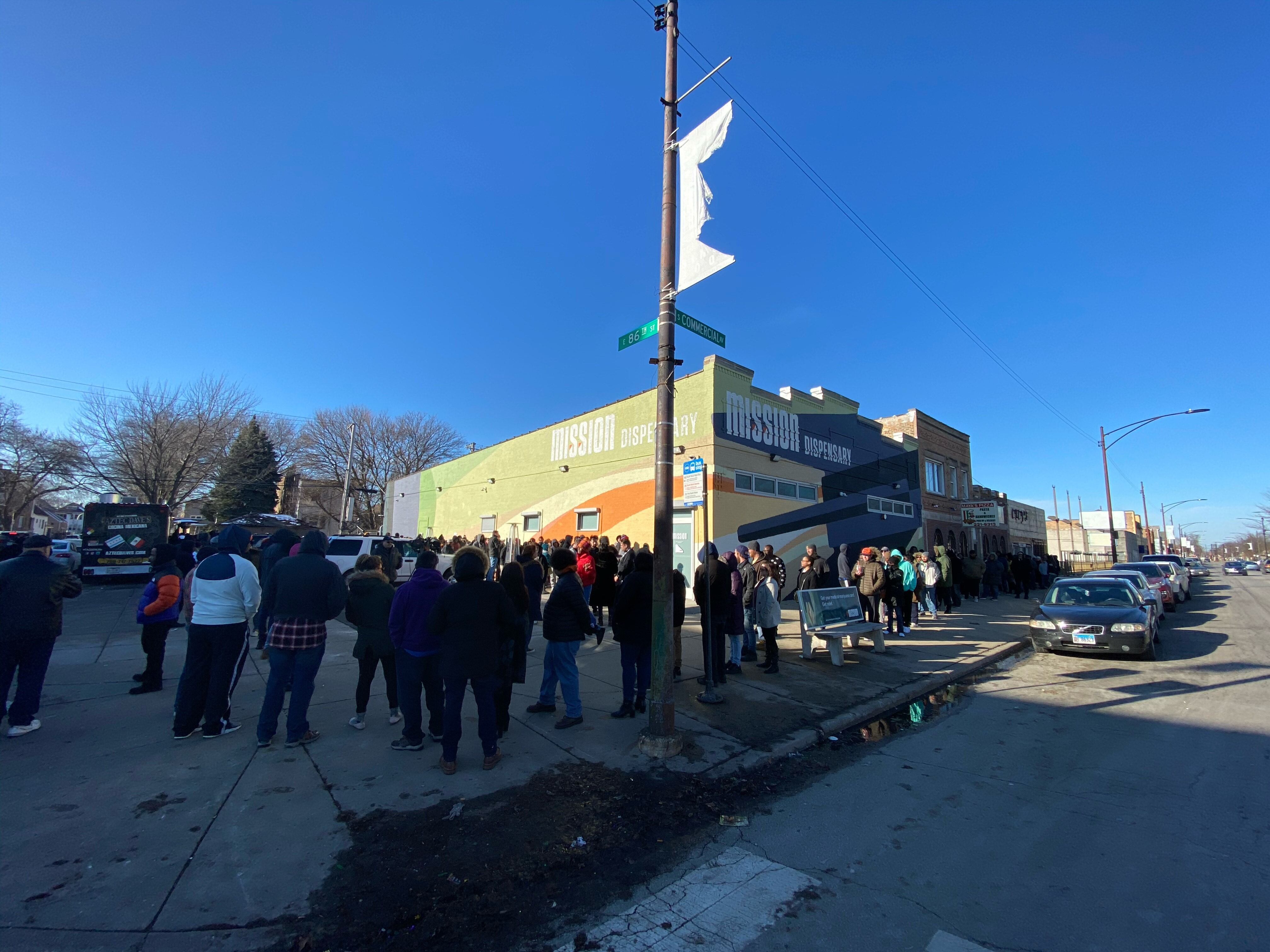Illinois cannabis enthusiasts had a lot to celebrate Jan. 1 after cannabis dispensaries across the state of Illinois opened their doors to all adults, 21 and up.
Despite only six months to prepare, some 37 dispensaries were licensed and ready, according to the Chicago Tribune, in time to sell $3.2 million worth of product across more than 77,000 transactions on the first day, alone. But the short lead time and explosion of customers have prompted worries the state will experience product shortages like those in other nascent markets.
Jason Erkes, spokesperson for Cresco Labs, one of the leading operators in Illinois, called the first two days a "huge" success.
"Nobody was able to point to anything that went wrong yesterday from an operational standpoint," he said. "People walked into retail stores, they bought products, they went to their homes to use them. And everything goes on just the way that it did the day before."
Customers rang in the New Year, then hustled out the door to purchase cannabis. Erkes said a queue started to form outside of Cresco's Sunnyside dispensary in Lakeview just after midnight on Jan. 1. Throughout the next day, there was a consistent crush of customers in line — about 300 to 400 at a time. Despite chilly temperatures, the mood was decidedly celebratory.
"It's better than Christmas when I got my Barbie Dream House," Jackie Ryan told reporters of becoming the first official customer to purchase adult-use cannabis in Illinois.
Operators only had six months to prepare for the day Illinois' customer base would increase ten-fold. It was a tall order for cultivators to bump their production capacity enough to accommodate the projected surge without added challenges like navigating local jurisdictions that opted out of adult-use sales, and pushback from critics who argued the system unfairly favors existing, large operators in the state.
Erkes said that since Gov. J.B. Pritzker signed the Cannabis Regulation and Taxation Act in June, it has been a constant push to raise cultivation and production capacity, convert retail stores to Cresco's new Sunnyside brand, hire staff, prepare processes for dealing with the volume of customers that might be expected on the first day, and, of course, get compliant.
"It's been a quick six months to really not just launch a business but launch an industry, and there's really nothing to compare it to in the country," he said. "This is really the first, large-scale launch of cannabis legalization in the country."
Although supply seems to have held out in the first few days of sales, many are concerned that operators won't be able to meet the crush of demand from customers, and that the market may fall victim to the same sorts of shortages seen in early days of Canada's adult-use rollout. Many companies preemptively instituted transaction caps to ensure supply for as many customers as possible.
Some operators, like Green Thumb Industries and Cresco Labs limited the quantities customers could purchase of products like flower, vapes, edibles, and pre-rolls. Others, like 4Front Ventures' Mission Dispensary, capped transactions at dollar amounts.

"We did not run out of any product classes, but did run out of some specific popular products and strains. We do not anticipate running out of inventory but will reassess our purchase limits once we review the final numbers and see how things progress in the coming days and weeks," Kris Krane, 4Front and Mission president, said in a statement.
Thursday also marked another important date for Illinois: the application deadline for some 75 new dispensary licenses, which the state plans to award by May 1. The application process favors equity applicants — business run by over-policed communities, or those who have a cannabis conviction — who have the advantage of additional points throughout the competitive application process. Many of those who submitted applications on Thursday were hoping to take advantage of the social equity program, ABC 7 reported that.
Even in the weeks leading up to the launch of adult-use, concerns still remained over the viability of ambitious social justice and equity provisions baked into Illinois' bill. In December, aldermen in Chicago City Council's Black Caucus launched a last ditch campaign to postpone sales by six months to encourage diversity in the market. Despite impassioned arguments from Alderman Jason Ervin, the measure ultimately failed.
But Gov. Pritzker, seemingly, has not forgotten his pledge to keep equity and social justice at the heart of the legalization push. On the eve of the launch of adult-use sales, he pardoned more than 11,000 low-level cannabis convictions. Some 700,000 are thought to be eligible for expungement under CRTA.
"Every state that has legalized cannabis has seen high demand and long lines in its earliest weeks, and to be sure, our state will too. But unlike other states, in Illinois, we purposely built a system where the market has room to grow, so that entrepreneurs, including especially those from the communities devastated by the war on drugs, will have real opportunities in this industry," Pritzker said in a statement.
The scale and speed of Illinois' adult-use launch, as well as the scope of its equity provisions, has earned it a reputation as a pioneer in U.S. cannabis legalization. States with cannabis on the ballot next November, will likely be watching closely to see if all goes well.
"Illinois has been a model for the nation in terms of how the medical program has been regulated," Green Thumb Industries CEO Ben Kovler told Cheddar. "We anticipate the exact same thing in the adult-use market and look forward to Illinois setting the table and showing the way for the rest of the country because there are many more states looking and studying what we've done here."












